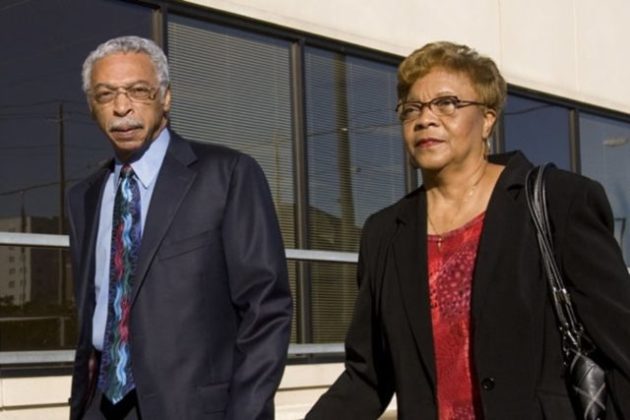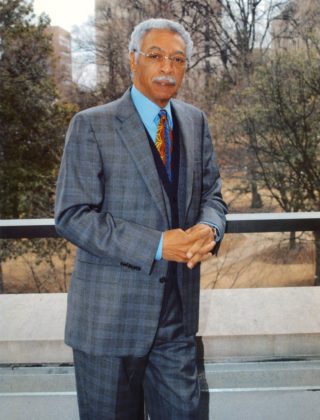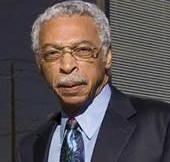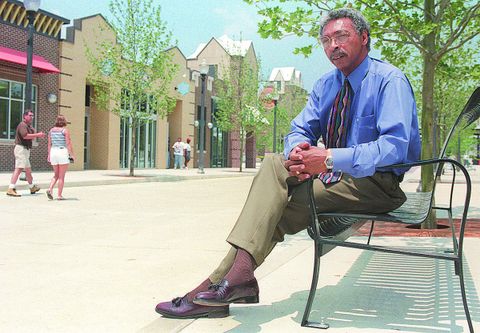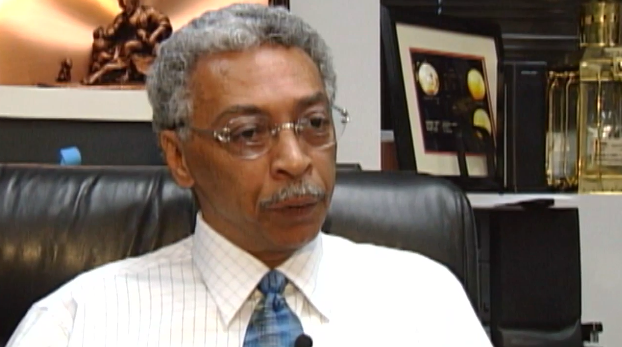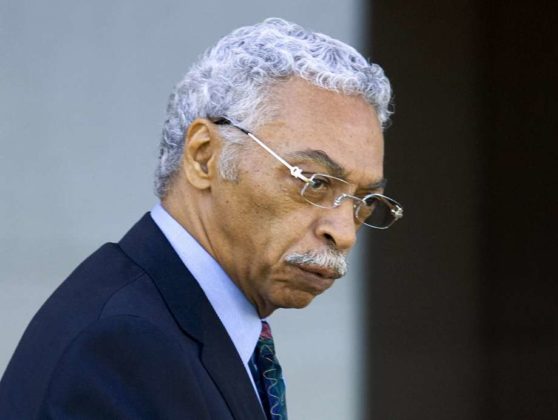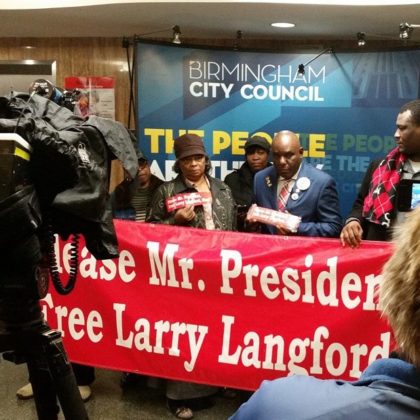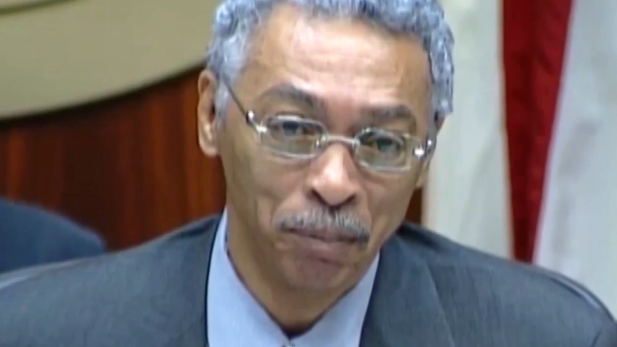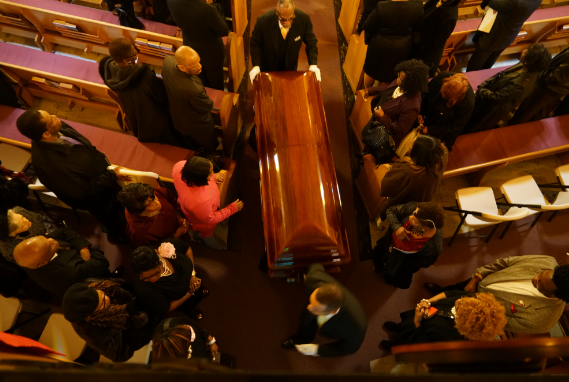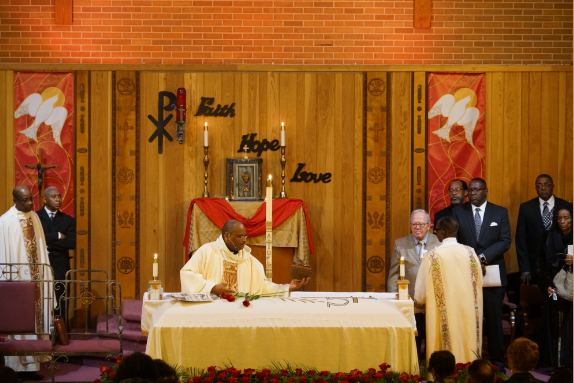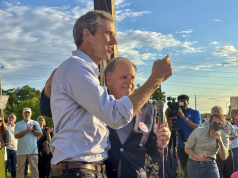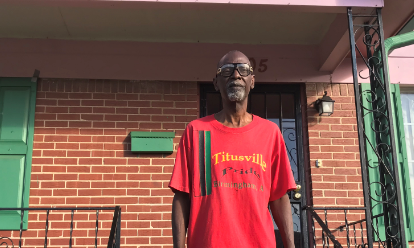
By Barnett Wright
The Birmingham Times
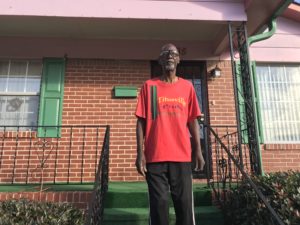
John Harris remembers Larry Langford from Titusville’s Loveman Village public housing community. They grew up together.
Harris remained in the neighborhood and became president of the North Titusville Neighborhood Association. Langford moved to Fairfield, where he was elected mayor, and would go on to serve as president of the Jefferson County Commissioner and mayor of the city of Birmingham. Still, Langford never forgot where he came from, Harris said.
“I have a lot of respect for him,” said Harris. “He did a lot of things for Titusville to help us, as far as taking down and building houses, getting [the grass in overgrown] lots cut, and bringing [homebuilders] to start building [new] homes on property [in the area]. … It is because of him that those houses were built.”
Langford died on January 8, at age 72. He suffered from several illnesses, including end-stage chronic obstructive pulmonary disease (COPD) and emphysema; pulmonary hypertension; right heart failure; and sickle-cell trait and anemia. Funeral services were held on Monday, January 14, at St. Mary’s Catholic Church in Fairfield.
Still Popular
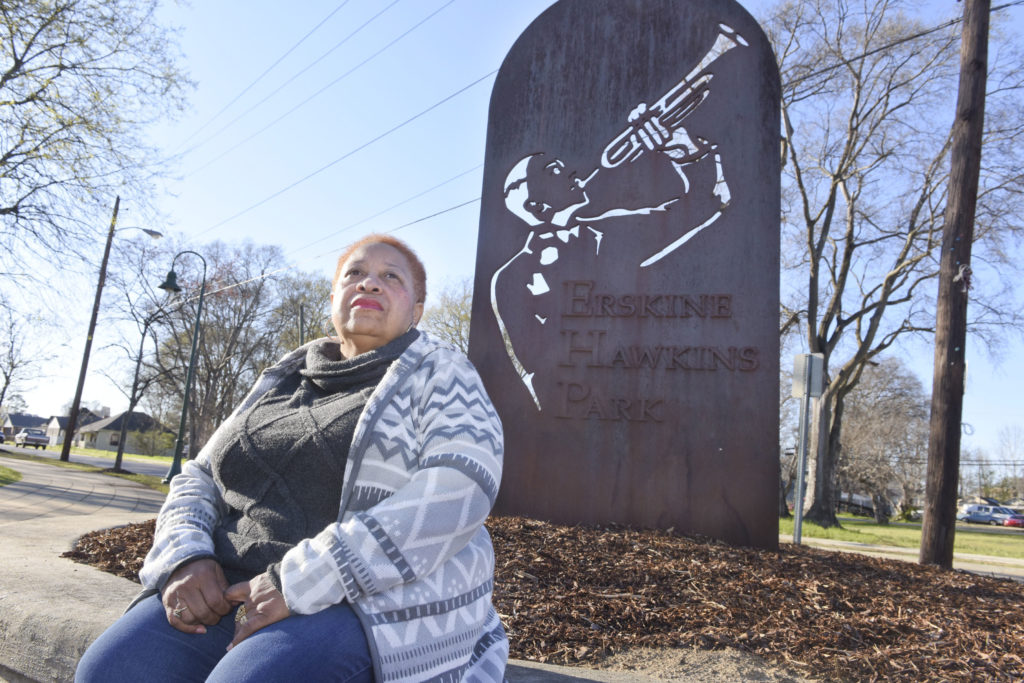
In Birmingham’s 99 neighborhoods, Langford remains as popular today as he was during the 2007 mayoral election when from a field of 10 candidates that included incumbent mayor Bernard Kincaid, Langford won without a runoff, capturing 50.1 percent of the vote.
Langford served as mayor of Birmingham from 2007 to 2009, when he was convicted of taking $235,000 in bribes while serving on the Jefferson County Commission in exchange for steering county sewer bond business to an investment banker. Prosecutors said during the trial that Langford accepted luxury suits, watches, and cash. He was sentenced to 15 years but released by a federal judge after serving eight.
Langford’s supporters across the city said the conviction doesn’t outweigh his impact on the city.
“It wasn’t like he murdered someone,” said Tuxedo Junction Neighborhood Association President Marine Coleman. “You can’t take away the character of a person. He always thought about the city and what he could do to improve the city, and that’s why everyone still admires him for his vision.”
Bush Hills Neighborhood Association President Walladeen Streeter
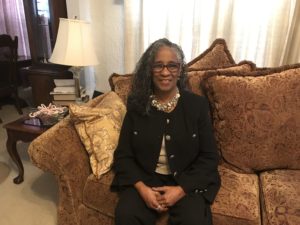
said, “I support him because I don’t feel he committed a crime so severe that he had to be punished the way they punished him. He’s a good person. He cared about the city of Birmingham and the people of Birmingham, and he showed it. He wanted to move Birmingham forward so it could become the top city in the world.”
Projects and Concepts
Residents point out several Langford-inspired projects and concepts that include the Birmingham CrossPlex, now a world-class multipurpose athletic and meeting facility on the western side of town; Railroad Park, a vibrant green space that serves as the city’s living room; expansion of the Birmingham Zoo; and the hotel and entertainment district near the Birmingham Jefferson Convention Complex (BJCC).
Additional projects include but are not limited to the renaming of Birmingham’s airport to Birmingham-Shuttlesworth International Airport in honor of local Civil Rights legend the Rev. Fred L. Shuttlesworth; the Southern Negro League Baseball Museum, Red Mountain Park and building of the downtown Regions Field, now home of the Birmingham Barons baseball team, which played in Hoover from 1988 to 2012.
“I think he’s done an awesome job in his vision for the city of Birmingham,” Coleman said. “It was his vision that each mayor after him has taken over or finished out, and I think that was a great thing they did. All that [Langford] had done was for the good of the city.”
Streeter said, “[Langford] showed that he cared for the city. He made sure citizens were given the needs that were due from the city in order to have the best quality of life. He made sure the appearance, the cleaning, the upkeep was up to standard in the neighborhoods. He made sure code enforcements were carried out by city employees. He just showed his love and concern for Birmingham.”
Remembered for Good
East Lake Neighborhood Association President Aisha Muhammad agreed.
“[Langford] started off as a young, vibrant, smart guy who was very ambitious,” she said. “He was very good for the city of Birmingham. We appreciate him so much for being our mayor, a black mayor, a strong mayor. He will be remembered for the good he did.”
Fairview Neighborhood Association President Gerri Robinson added, “I worked for the city of Birmingham for a long time, … and I have seen some of [Langford’s] good efforts. I always admired his vision for much of what has happened. I know he had a lot of input into a lot of things that have actually matured from what he initiated. He started some things, and … he finished some. He had a really good history of doing things and making things happen. He was a person who made things happen.”
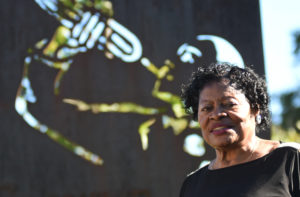
Even after his arrest, trial, and conviction, Langford’s support remained strong in Birmingham’s 99 neighborhoods.
“I’m not saying he was perfect, because he wasn’t,” said retiredTuxedo Junction Neighborhood Association President Magnolia Cook. “None of us are perfect. We all have done wrong, and if we continue living, we will do wrong, but we should be remembered for whatever good or right we’ve done.”
Birmingham Times Staff Writer Erica Wright contributed to this article.
How Larry Langford became a once-in-a-lifetime politican
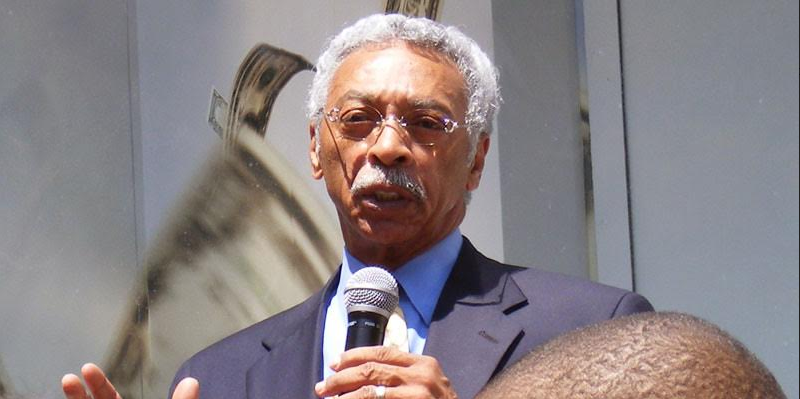
By Barnett Wright
The Birmingham Times
Love him or not, Larry Paul Langford was a once-in-a-lifetime politician, the likes of which had never been seen before in Birmingham and probably will not be seen again anytime soon, say all who knew him.
Those who love and admire Langford often recall the myriad projects and initiatives he proposed in and around the Magic City—from the Birmingham CrossPlex, now a world-class multipurpose athletic and meeting facility on the western side of town, to the renaming of the city’s airport just northeast of the city in honor of local Civil Rights legend the Rev. Fred Shuttlesworth—as well as the times he would give the shirt off his back and pass out $100 bills to homeless people in Linn Park downtown.
Others are quick to counter, calling attention to Langford’s 2009 conviction for taking $235,000 in bribes while serving on the Jefferson County Commission in exchange for steering county sewer bond business to an investment banker. Prosecutors said during the trial that Langford accepted luxury suits, watches, and cash. He was sentenced to 15 years and released by a federal judge after serving eight.
Langford, terminally ill at the time of his release, was freed on Dec. 29, 2018, after a federal judge reduced the former Birmingham and Fairfield mayor’s 15-year bribery sentence to time served. Langford had already served more than half of his sentence.
Langford died on January 8 at age 72. He suffered from several illnesses, including end-stage chronic obstructive pulmonary disease (COPD) and emphysema; pulmonary hypertension; right heart failure; and sickle-cell trait and anemia. Funeral services were held on Monday, January 14 at St. Mary’s Catholic Church in Fairfield.
“Ahead of His Time”
Not many elected officials will have an obituary written with such passion by those who both supported and opposed them. With Langford, however, that’s no surprise.
“I hope that after some time has passed and people can get out of their polarized camps … [they] can at least sit back and look over the totality of [his work] and realize how much he did for a city that he loved,” said Deborah Vance Bowie, who served as Langford’s chief of staff in the city of Birmingham from 2007 to 2009.
To understand Langford’s legacy is to acknowledge, as his supporters do, that several major projects and concepts—including the CrossPlex, Railroad Park, and the Birmingham Zoo expansion, as well as the hotel and entertainment district near the Birmingham Jefferson Convention Complex (BJCC)—were either proposed or had begun during Langford’s term as mayor of Birmingham.
“There is no doubt that Langford was a pioneer and visionary who was well ahead of his time,” said Jefferson County Commissioner Lashunda Scales, who now represents Langford’s former commission district. “Though he was unconventional in his approach, … we must recognize and cannot deny that those projects were seeded by Langford.”
Additional projects include but are not limited to the renaming of Birmingham’s airport to Birmingham-Shuttlesworth International Airport; the Southern Negro League Baseball Museum, Red Mountain Park and Regions Field, now home of the Birmingham Barons baseball team, which played in Hoover from 1988 to 2012.
Langford’s conviction and imprisonment do not define him, say those he represented in the Birmingham community.
“We all have done wrong, and if we continue living, we will do wrong, but we should be remembered for whatever good or right we’ve done,” said retired Tuxedo Junction Neighborhood Association President Magnolia Cook.
Bishop Calvin Woods, president of the Birmingham Metro Southern Christian Leadership Congress (SCLC) and pastor of Shiloh Baptist Church in Norwood, said, “I saw the good work he did, … and we’re reaping the benefits of a lot of the work he did right now. The [CrossPlex], what they have out there now, a lot of that was his work. … I’m not saying the others didn’t do some work in it, but that was his child. He worked hard. … That was his seed. … I thank God for the good work [Langford] did. It will never be forgotten.”
For those who say Langford’s legacy is complicated, his niece LeNa Powe McDonald disagreed.
“His legacy is not … complicated,” she said. “His legacy is very simple: he told you what he would do, and he did it. … However you feel about that, that complication is on you. … [My uncle] was light years ahead of where Birmingham could be. He needed to [put forth his ideas] in order for us to realize how far we could go.”
Handing Out $100 Bills
Langford was also known for his love of the city’s residents in a way that few would know unless they were around him. Charles Long, who served as chief of staff during Langford’s tenure on the Jefferson County Commission from 2002 to 2007, remembers when his boss would hand out $100 bills to homeless people in Linn Park.
“Security would have a fit because the only thing we could imagine was that some nut would try to rob him,” Long said. “He would take a smoke break and go to Linn Park, and I or somebody had to be with him because he would give away stuff. He would give homeless people clothes off his back. I’ve seen him do it.”
Activist Frank Matthews, who worked in City Hall under Langford as co-director in the Mayor’s Office of Citizens Assistance (MOCA), remembered when the mayor would give away ties.
“If he had a necktie on and somebody said, ‘Mayor, I like that tie,’ it was theirs. It was coming off, and ain’t nothing you could do to stop him,” Matthews recalled. “It didn’t matter if it was a $300 tie.”
There was something else about Langford that stood out, Matthews said.
“There were two things he didn’t do. [First], he didn’t walk by trash and not pick it up. If [he] saw a piece of paper, he picked it up. He didn’t wait for anybody else to do it. [Second], he didn’t walk by anybody and not speak to them. Anybody he walked by, he spoke to them.”
Langford was also known for having a way of touching those who worked for and around him.
“Mayor Langford was a kind and honorable man,” said April Odom, who worked as Langford’s director of communications from 2007 to 2009 and held that position under former Mayor William Bell until she retired in 2017. “He had an innate ability to both connect and communicate with voters that was just remarkable. [He] believed in me when no else even knew my name, and for that I will always be grateful. It was truly a privilege to work for him.”
From Public Housing to City Hall
Langford was born on March 17, 1946. He grew up in the Loveman Village public housing community in Titusville and attended A.H. Parker High School. He was one of the first black personalities on Birmingham television, as a reporter for WBRC-TV in the early 1970s and served on the Birmingham City Council from 1977 to 1979.
As the first black mayor of Fairfield, a position he held from 1988 to 2002, Langford successfully lobbied to grant his office more power over the Fairfield City Council and won an increase in the city’s sales tax, which he used to bail out Fairfield City Schools. Frustrated by his inability to lure a family restaurant to economically depressed Fairfield, he used $300,000 of city money to build one. He named it “Glory’s,” as in “To God be the glory.” At a community pool he built, he banned bikinis and Speedo swimsuits and posted a sign cautioning, “If you wear a size 20, buy a size 20.” He may be best known, however, for initiating construction of the $60 million VisionLand Theme Park, now Alabama Adventure Amusement Park and Splash Adventure Water Park, which was built in Bessemer in 1998. The restaurant, community pool, and VisionLand all had one thing in common—they either closed or ended up in bankruptcy.
In 2002, Langford was elected to the Jefferson County Commission, where he served as president from 2002 to 2006 and implemented one of his most ambitious initiatives: a 1 percent sales tax for school construction in 2005. The plan generated $1 billion for the county’s 12 school systems, including $350 million for Birmingham. Today, brand new schools are in place across Jefferson County from proceeds of that school tax.
It’s also during his time on the County Commission that Langford’s legal problems began. He would be convicted of receiving $235,000 in bribes from William Blount of Parrish & Co., some of which were directed through former Democratic Party Executive Director Al LaPierre, to help influence bond deals in Jefferson County.
“Let’s Do Something”
Even with his legal issues mounting, Langford, in 2007, after losing the County Commission presidency to Bettye Fine Collins, ran for mayor of Birmingham. From a field of 10 candidates that included incumbent mayor Bernard Kincaid, Langford won the election without a runoff, capturing 50.1 percent of the vote. He served as mayor from 2007 to 2009.
“He grew up in the projects and always had compassion for people that needed a helping hand,” said Long, former Langford chief of staff at the county. “He was old school. He was stern, but he was what Birmingham needed at the time. … He won in a field of 10 people without a runoff because that’s what Birmingham needed at that time. … I don’t know if you’ll ever see another individual who can line up in a race with 10 people and walk out of there without a runoff.”
Langford—a thin and wiry man who seldom ate regular meals, living off corn chips, three banana splits, and half-pack of Marlboro Lights a day—campaigned for mayor in 2007 with a simple slogan: “Let’s Do Something.”
“Everybody knew that his theme, his slogan, not only as a county commissioner but also as mayor was ‘Let’s Do Something’—and he did,” said Alabama State Rep. Juandalynn Givan (D-Birmingham).
Birmingham lawyer Emory Anthony also remembers Langford’s campaign for mayor: “He was very aggressive, and he tried to change things immediately after taking office. His slogan was ‘Let’s Do Something,’ so he was very aggressive with that. He was different. He was very aggressive in making sure that if something needed to be done, he was going to go ahead and do it. He wasn’t one who sat around and tried to debate the issue. He would just go and say, ‘I’m going to make it happen.’”
As mayor, Langford got the Birmingham City Council to double business license fees and increase the city sales tax to fund a list of projects, including building a domed stadium, revamping mass transit, and establishing a scholarship program. While those initiatives were never realized, the sales tax—among the highest in Alabama at 10 percent on the dollar—and license fees remain in place and have allowed the city to keep its budget balanced. The extra-cent tax brings in tens of millions of dollars annually and has helped the city avoid serious cuts, finance officials have said.
“Tough Love”
Long said Langford was in a position to delve out tough love to Birmingham and give them hope when the city needed hope and tough love.
“As a man, as a person, as a human being, he gave more of himself than a majority of the people that I know,” Long said.
Langford’s style resonated with residents.
“He showed that he cared for the city,” said Bush Hills Neighborhood Association President Walladeen Streeter. “He made sure citizens were given the needs that were due from the city in order to have the best quality of life.”
Bishop Woods added, “I think the work he did speaks for itself. He strove as others have done to open more opportunities to minorities, but at the same time … he respected everybody, all races. He believed in what he believed in, … and his objective, I believe, was to help everybody move forward.”
Many people, even some who worked for him, saw some of Langford’s initiatives as half-baked. His former Birmingham mayoral chief of staff Bowie recalled those days.
“There were many times, behind the scenes, that our executive team was not on the same page with the mayor,” she said. “There [would be several] projects he wanted to push that some of us didn’t have the confidence in. … There was a lot of internal strife about some of those projects.”
Still, Bowie and others said many of Langford’s instincts proved correct.
Birmingham attorney Byron Perkins said, “I think he had a big heart for Jefferson County and a big heart for the city of Birmingham. He was a true visionary. A lot of the [good] things going on in the city right now were projects and programs [Langford] started.”
Alabama State Rep. Rod Scott (D-Fairfield) said Langford’s ideas and projects laid the foundation for future administrations.
“He presented some great ideas that were good enough to be followed up on by succeeding mayors. … They followed up on them because I believe that they understood that they would be successful,” Scott said. “I think [Langford] will be remembered as someone who was not afraid to present big ideas. … The [Uptown entertainment district at the BJCC], the CrossPlex, those were big ideas. Even VisionLand was a big idea.”
The ideas worked because Langford was “one of the best salesmen I’ve known,” said Alabama State Rep. John Rogers (D-Birmingham).
“I think [he] was a very innovative guy. … He always had a fresh idea. If something didn’t work, he’d go ahead and push it anyway. … He would start selling it early on, before he brought it up. That’s why I say he’s one of the best salesmen I’ve known.”
The Langford Legacy
The question for supporters is whether Langford’s incarceration tarnishes his accomplishments. Federal officials didn’t believe his legacy was worth celebrating.
In December 2008, Langford was arrested by the FBI on charges of conspiracy, bribery, fraud, money laundering, and filing false tax returns in connection with a bribery scheme. In 2009, he was convicted of receiving $235,000 in bribes from William Blount of Parrish & Co. According to the indictment, Blount helped Langford receive a $50,000 loan, which was used to purchase jewelry, including a Rolex watch, and designer clothes. The bond deals resulted in a $3.2 billion sewer debt and contributed to the Jefferson County Commission declaring bankruptcy on Nov. 10, 2011, in what at the time was the largest municipal bankruptcy in U.S. history.
“Public officials are not above the law, and corruption among them will not be tolerated,” First U.S. Attorney John England said in 2011. “Langford’s willingness to seek and accept bribes in order to dole out county business helped bring Jefferson County to the brink of financial ruin.”
On Dec. 28, 2018, U.S. District Court Judge Scott Coogler signed an order reducing Langford’s 15-year prison sentence, of which Langford had served more than half.
Bishop Woods said, “We know the problems [Langford] ran into, and we were hoping he would overcome those problems. But if the light is strong enough, it’s mighty strong. The darkness didn’t put out his light.
“The good he’s done in life will live on forever, and I think his righteousness will certainly far exceed any mistakes he may have made. We all have fallen short of God’s glory at some point or another, so if you go to God and get reconciliation with that, with what they say he did, God is a forgiving God.”
Birmingham Times staff writers Ameera Steward and Erica Wright, and the Baltimore Sun contributed to this article.


